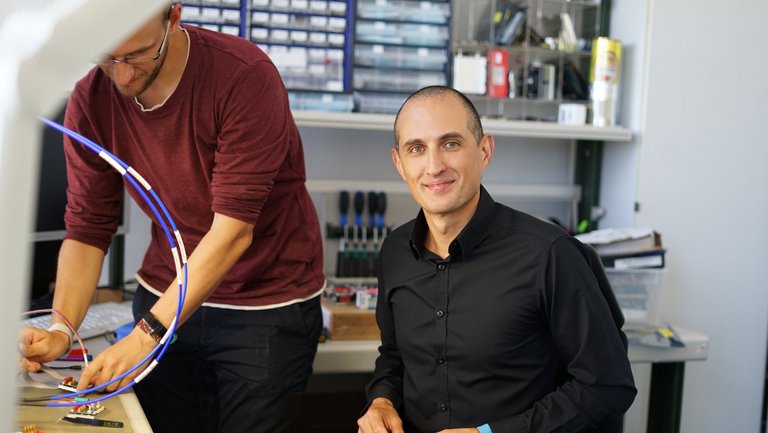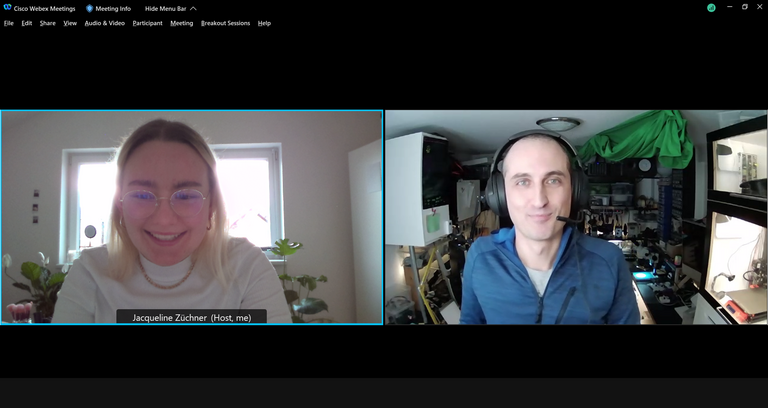As head of the Electronic Measurement and Signal Processing Group at TU Ilmenau, Prof. Giovanni Del Galdo researches modern communications technologies and is driving forward the new 6G mobile communications standard. In an interview, the scientist explains why he attaches great importance to application-oriented research and how the German university system differs from the Italian one.

Hello Prof. Del Galdo, you do research in the field of mobile communications and signal processing. What sparked your interest in your field?
I had an interest in different fields. Among them were medicine, engineering and philosophy. The decision for "Telecommunications Engineering" was rather random. But once I started, I liked it and went ahead with it.
Did you always want to work and do research abroad?
I was oriented to the fact that my parents' stays abroad helped them enormously in their personal development. I myself lived in the U.S. for a year and graduated from high school there. My plan was to stay longer in the USA. At that time, the political situation was different and I liked everything I saw. However, staying longer was not possible in 2001 due to the situation with the terrorist attacks, because my visa was stopped. During that time my wife was in Germany with an Erasmus program and I thought "why not Germany?". During my search, I came across a master's thesis at the TU Ilmenau. My first thought was "Ilmenau - where?". But in the end I came to Ilmenau, did my PhD under Professor Haardt and I liked it more and more in Germany. I am very glad that I stayed in Europe.
Was there a language barrier at the beginning?
Without having any long-term plans for it, I started taking German courses every Saturday for three hours at the Goethe Institute in Milan. I thought the language could be an advantage later in my professional life. In Europe, Germany has important economic power and relevance, so the language was interesting to me, along with English. I made the biggest leap when I became a doctoral student. I taught seven seminar groups and my vocabulary developed from group to group. To prevent misunderstandings, I only express myself clearly in German. But that suits me well as a person.
Apart from the language, have there been other changes with the change of location? How can you compare the TU Ilmenau to the University of Milan?
I like to compare the two locations, but you have to take into account that I am comparing the current situation in Ilmenau and my time as a student in Italy. There are a few years and at least one reform in between, so it is possible that things are different in Milan nowadays. The university in Milan is big, my course was popular and I sat in the lecture hall with over 200 other students. The contact with the professors was different because of that. My studies consisted of ten semesters, no internship and a thesis. One big difference is the exams. In Italy, you have the opportunity to sit for an exam seven times a year, three times each after the summer and winter semesters and once in September. There is no rule that you fail after a certain number of failed attempts. I think the system is better because you can always try to improve your grade. Another point of comparison: all materials and oral exams were publicly available. It follows that there was no recycling in the exams and each one was completely new. The oral exams in Italy are also public. Apart from the examiner, you are in a lecture hall with 40 other students and everyone can watch. When you are examined yourself in a few days, you can answer the questions for yourself and I think that's really good. Italy is also much more theory-oriented in teaching.
What was your incentive to go into research in your field?
It happened a bit by chance, because it turned out that my skills are well suited for research. You need an understanding of mathematical theory and a way of working that has little practical relevance. I'm not fazed when something doesn't work. I have the right inclination for that and I enjoy it.
What other projects would you like to do research on?
Life is too short to do everything and I love any kind of science. Apart from the field of mobile communications, where we are currently adapting the standardizations for 5G and 6G, my research currently lies in the question of how to manage people. My responsibilities at the Fraunhofer Institute for Integrated Circuits include department management. For that, I need to know psychology and be able to solve problems with people. I enjoy solving complicated problems the most, and managing a group full of individuals is challenging. I enjoy that. So far, I haven't had much trouble finding new challenging issues that I enjoy tackling. Therefore, I am not worried that it will be different in the future.
At what points do people come into contact with your research in everyday life?
Electronic measurement and signal processing is a very central topic for society because it goes far beyond typical communication. It's about machines themselves communicating with each other. There is hardly any industry that we come into contact with in everyday life that does not depend on communication and measurement technology. Hence the high relevance for society.
Multi-antenna (MIMO) systems have been one of the most active areas of research in wireless communications since 2015. How did you become interested in channel modeling for your PhD in 2007?
The research lies in investigating technologies with potential that have not been worked out enough. At my time, for MIMO systems, it was not clear how large the capacity would be or what the best algorithms were to exhaust a capacity.
What outcome did you expect at that time?
My experience in my PhD was that you know where you start your research, but you don't know where it ends. There is little chance of going down in history like Leibniz. If you have an idea, you have to look at what already exists on the topic. It's not a bad sign if the topic has already been published, because it confirms that the idea was good. Personally, I take it very lightly because I wish to make a big contribution, but am happy with any progress. To answer the question in conclusion: I had an idea I wanted to dive into, but not a goal I was aiming for.
What new ways of working have you found at the Fraunhofer Institute for Integrated Circuits?
The so-called Fraunhofer model aims to be one-third funded by industry. This results in the demand and pressure to create practical technologies. This forces the focus to be on technologies that have the potential to become relevant to practice. I got to know this clear balance between theory and practice better at Fraunhofer.
What progress do you hope to see in your field in the next five to ten years?
That's a difficult question, because you have to work on boundaries with other fields of research and it's hard to estimate what opportunities will arise and when they will be exhausted. Two topics that can be clearly defined are artificial intelligence and quantum communication. Here, however, completely different rules of the game will apply, and we will have to explore them.
Interview: Jacqueline Züchner
Contact
Prof. Giovanni Del Galdo
Head of the Electronic Measurement and Signal Processing Group


